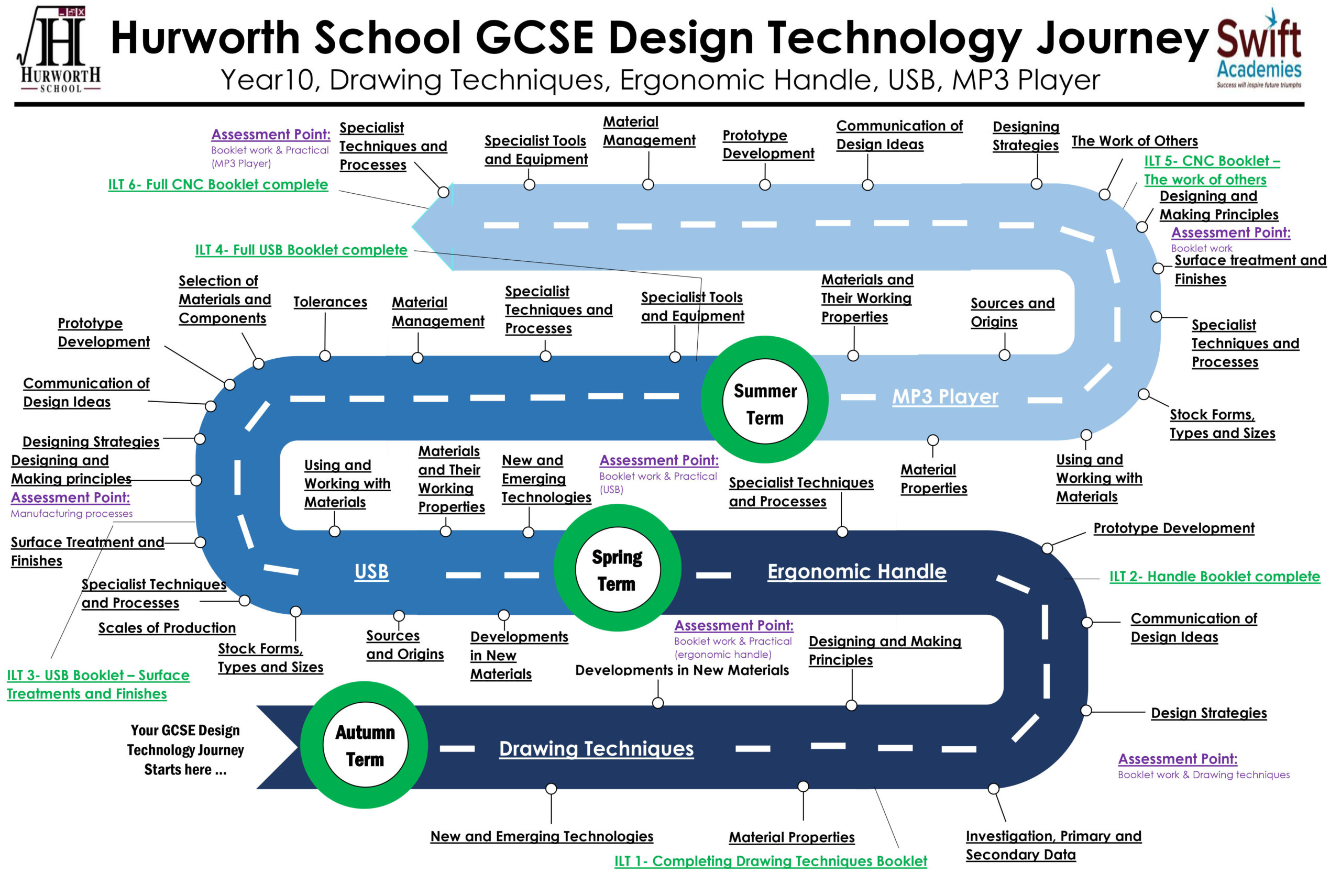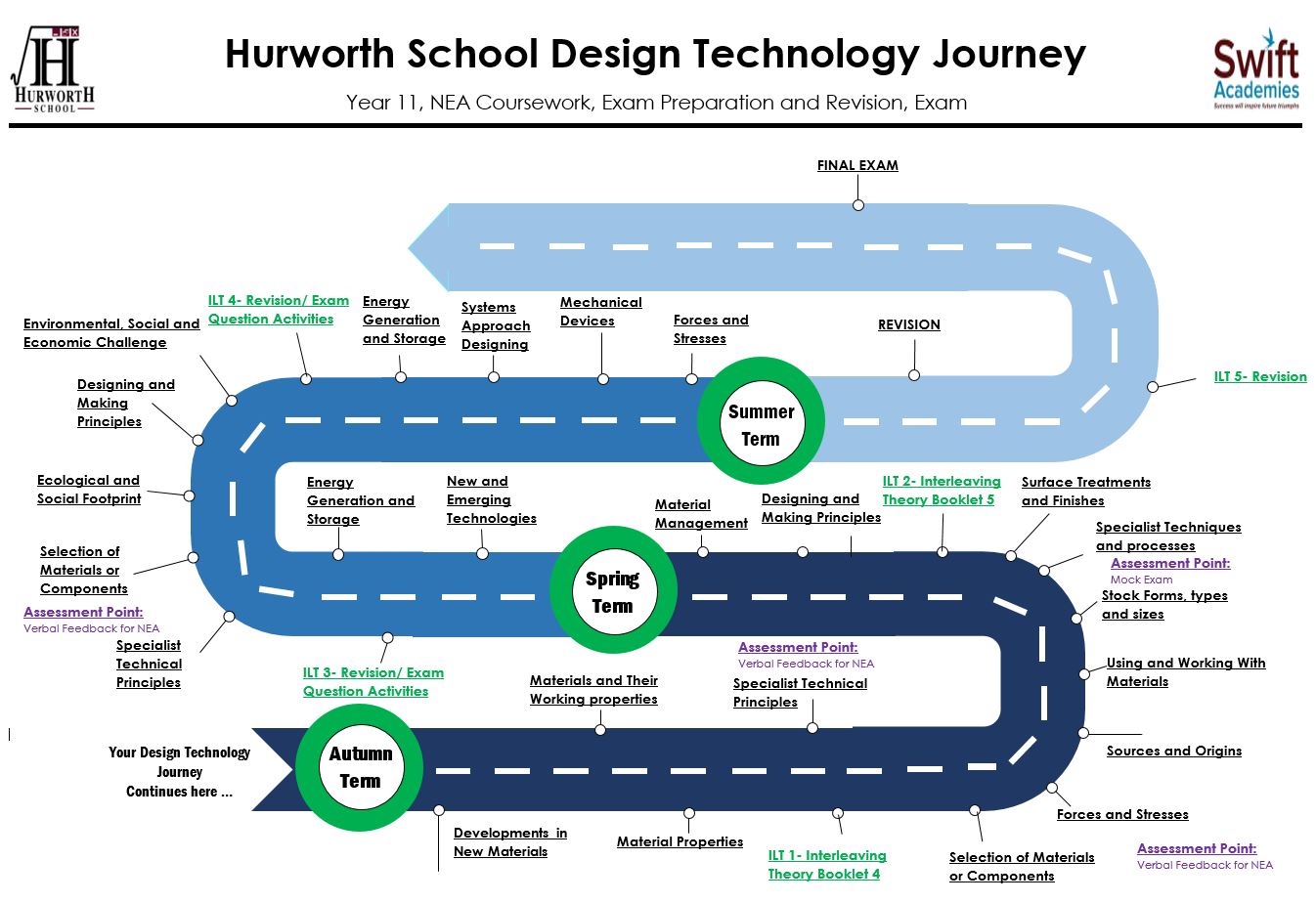Why do we study Design & Technology?
Our Design & Technology curriculum is broad, balanced and carefully planned to best prepare students for engagement in the many different KS4 specifications we offer in the D&T Department. The content within these specifications, is carefully adapted and sequenced so that KS3 students can access content, then continue to build on this knowledge and understanding as they tailor towards specific disciplines.
Our students are given the opportunity to build and apply a repertoire of knowledge, understanding and skills in order to design and make high-quality prototypes and products for a wide range of users.
Furthermore, our curriculum also focuses on allowing pupils to understand and apply the principles of nutrition and by learning how to cook, which gives them additional life skills.
Year 7
Learning Outcomes
In Year 7, students will explore the core skills and knowledge of Design and Technology to develop their practical making and design skills. Students will work with a range of different materials and apply a range of manufacturing techniques during each project. Students are encouraged to demonstrate creative thinking, problem solving skills and build on their resilience.
Topics Taught – Pupils study D&T for 1 term in Year 7.
Spatula
- Health and Safety
- Analysing existing products/ solutions
- Modelling
- Cutting tools
- Material removal, sanding and smoothing
- Surface finishing
- Evaluating and testing
Textiles- Ugly doll
- Sources and origins of materials- Textiles
- Fibres
- Fabrics
- Components
- Textiles tools equipment and processes

Year 7 Documents (click to download)
Year 8
Learning Outcomes
In Year 8, students are encouraged to become more autonomous in their work. Creativity and innovation are at the forefront throughout each Scheme of Learning.
Students will develop confidence from their previous learning and strive to work independently to create final products with a high quality professional finish.
Topics Taught – Pupils study D&T for 1 term in Year 8.
Metals- sheet Metal Animals
- Sources and origins of metals
- Types of metals
- Designing
- Jigs and templates
- Metal processes, tools and equipment
- Finishing techniques
Polymers- Acrylic Photo frame
- Design brief/ Task analysis
- Polymers materials
- Paper and card materials
- Manufacturing Processes
- Use of CAD and ICT
- Evaluation

Year 8 Documents (click to download)
Year 9
Learning Outcomes
In Year 9, students have the opportunity to explore in more depth a wide range of materials, manufacturing processes and creative design based activities.
D&T- Clock Project
In the first project students will design and make a clock using a variety of materials, based on their properties and characteristics. Students will develop a range of technical drawing skills and build on their prior knowledge of CAD/CAM. Students will focus on creating real life quality product using materials and technologies that are best suited to the job. In order to introduce higher level thinking and designing skills students will design their clock using a famous 20 Century Art/Design movement as inspiration.
Topics Taught – Pupils study D&T for 1 term in Year 9
Clock project
- Material properties
- Design strategies
- Hand tools and equipment
- Power/ Machine tools
- New and emerging technologies
- Material management
- Mechanical devices
- CAD, CAM and CNC

Year 9 Documents (click to download)
Year 10
Exam Specification
GCSE Design and Technology
AQA Specification
Learning Outcomes
Throughout year Y10 students will be taught Core Technical Principles, Specialist Technical Principles and Designing and Making Principles. These will be applied through the 3 different projects shown below, not in a chronological way as shown in the Design and Technology Specification but rather applying the knowledge to project based tasks. By Y11 they will be covering all the theory areas left. All 3 projects shown below will encompass a theory booklet, an A3 booklet to show and test drawing techniques and finally an end of unit test.
Handle Project/Drawing Skills
- USB Project/Laser cutter
- Lighting Project
- Additional Design challenge tasks will also be completed
Topics Taught
Autumn Term
Core Technical Principles, Specialist Technical Principles and Designing and Making Principles.
- New and emerging Technologies
- Developments in new materials
- Material properties
- Designing and making principles
- Investigation, primary and secondary data
- Design strategies
- Communication of design ideas
- Prototype development
- Specialist techniques and processes
Spring Term
Core Technical Principles, Specialist Technical Principles and Designing and Making Principles.
- New and Emerging Technologies
- Developments in new materials
- Materials and their working properties
- Material properties
- Sources and origins
- Using and working with materials
- Stock forms, types and sizes
- Scales of production
- Specialist techniques and processes
- Surface treatments and finishes
- Designing and making principles
- Design strategies
- Communication of design ideas
- Prototype development
- Selection of materials and components
- Tolerances
- Material management
- Specialist tools and equipment
- Specialist techniques and processes
Summer Term
Core Technical Principles, Specialist Technical Principles and Designing and Making Principles.
- Materials and their working properties
- Material properties
- Sources and origins
- Using and working with materials
- Using and working with materials
- Stock forms, types and sizes
- Specialist techniques and processes
- Surface treatments and finishes
- Designing and making principles
- The work of others
- Design strategies
- Communication of design ideas
- Prototype development
- Material management
- Specialist tools and equipment
- Specialist techniques and processes

Year 10 Documents (click to download)
Year 11
Exam Specification
GCSE Design and Technology
AQA Specification
Learning Outcomes
Throughout Year 11 students will complete their NEA by the end of February and will then use their remaining time completing the revision for their forthcoming summer exam. However, throughout Term 1 and some of Term 2 they will also be completing the last theory revision booklet. By Term 2 they will have completed all 6 revision theory booklets.
Topics Taught
Autumn Term
Core Technical Principles, Specialist Technical Principles and Designing and Making Principles.
- Developments in new materials
- Materials and their working properties
- Material properties
- Specialist technical principles
- Selection of materials or components
- Forces and stresses
- Sources and origins
- Using and working with materials
- Stock forms, types and sizes
- Specialist techniques and processes
- Surface treatments and finishes
- Designing and making principles
- Material management
Spring Term
Core Technical Principles, Specialist Technical Principles and Designing and Making Principles.
- New and Emerging Technologies
- Energy Generation and storage
- Specialist technical principles
- Selection of materials or components
- Ecological and social footprint
- Designing and making principles
- Environmental, social and economic challenge
- Energy Generation and storage
- Systems approach to designing
- Mechanical devices
- Forces and stresses
Summer Term




